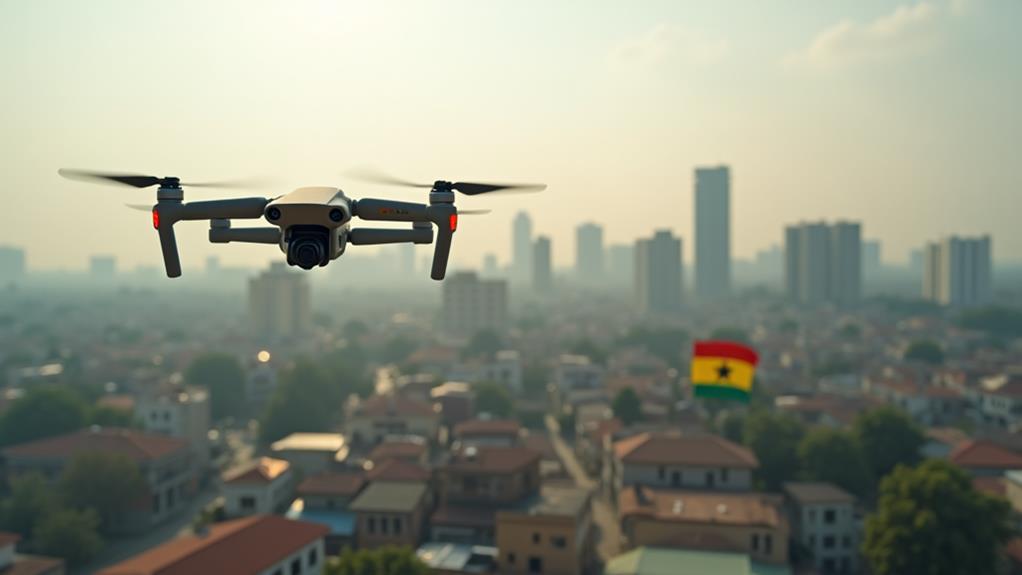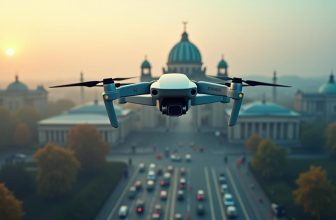
Did you know that Ghana has witnessed a 400% increase in drone usage over the past two years? As you consider flying your drone in Ghana, it's vital to understand the laws regulating their use. You might assume that registering your drone is a straightforward process, but there's more to it than meets the eye. With weight and size restrictions, altitude and airspace rules, and proximity regulations to navigate, it's easy to get caught off guard. What you don't know can cost you – and we're not just talking about fines.
Contents
Key Takeaways
- Drones over 250g or with a camera must be registered with the Ghana Civil Aviation Authority (GCAA) before operation in Ghanaian airspace.
- Operation permits and licenses are required for safe and compliant flight operations, including aerial permitting and liability insurance.
- Drones must comply with weight and size restrictions, categorized into three classes by the GCAA, to avoid penalties or confiscation.
- The maximum flight altitude is 122 meters above ground level, and airspace restrictions include avoiding airports, military bases, and national parks.
- Failure to comply with Ghana's drone regulations can result in severe penalties, including fines up to GHC 10,000 and imprisonment for up to 5 years.
Registering Your Drone in Ghana
All drones weighing over 250 grams or equipped with a camera, regardless of weight, must be registered with the Ghana Civil Aviation Authority (GCAA) before operation in Ghanaian airspace.
You'll need to provide identification and ownership details, as well as information about your drone's make, model, and serial number. It's vital to verify your drone is registered correctly to avoid any legal issues or fines.
Consider investing in drone insurance options to protect yourself against liability claims or damage to your drone. Regular drone maintenance tips, such as checking propellers and batteries before each flight, can also help prevent accidents and guarantee a smoother registration process.
When registering, you'll need to provide proof of liability insurance and a certificate of airworthiness for your drone. Don't risk flying without registration – it's a serious offense that can result in confiscation of your drone or even criminal prosecution.
Permits and Licenses Required
In Ghana's drone regulatory landscape, operation permits and licenses play a crucial role in guaranteeing safe and compliant flight operations.
As a drone operator, you'll need to obtain the necessary permits and licenses before taking to the skies. The Ghana Civil Aviation Authority (GCAA) issues permits for aerial permitting, which involves submitting your flight plans and obtaining approval prior to each flight.
Additionally, you'll need to secure drone insurance options that meet the GCAA's requirements. This includes liability insurance to cover damages to people, property, and the environment.
You may also need to obtain permission from property owners or local authorities before flying over private or restricted areas. Failure to comply with these regulations can result in fines, penalties, or even confiscation of your drone.
Certify you understand the requirements and obtain the necessary permits and licenses to avoid any legal issues.
Drone Weight and Size Restrictions
When preparing to fly your drone in Ghana, you'll need to guarantee it meets the weight and size restrictions set by the Ghana Civil Aviation Authority (GCAA). These restrictions are in place to safeguard safe Drone Handling and to prevent any potential risks to people, property, and other aircraft.
The GCAA has categorized drones into three classes based on their weight and dimensions.
| Drone Category | Weight | Drone Dimensions |
|---|---|---|
| Micro | ≤ 250g | ≤ 30cm x 30cm x 30cm |
| Small | > 250g ≤ 25kg | > 30cm x 30cm x 30cm ≤ 1.5m x 1.5m x 1.5m |
| Large | > 25kg | > 1.5m x 1.5m x 1.5m |
You must certify your drone falls within one of these categories to comply with the GCAA's regulations. Failure to do so may result in penalties or even confiscation of your drone. Always verify your drone's specifications before flying in Ghana to avoid any issues.
Altitude and Airspace Rules
You'll need to be aware of the maximum flight altitude when operating a drone in Ghana, which is capped at 122 meters above ground level.
Additionally, you'll need to respect airspace restrictions, avoiding areas like airports, military bases, and national parks.
Failure to comply with these rules can result in serious consequences, including fines and even imprisonment.
Maximum Flight Altitude
Operating a drone in Ghana's airspace requires adhering to strict altitude restrictions to guarantee safe distances from obstacles, people, and other air traffic.
You must verify your drone doesn't exceed the maximum flight altitude of 122 meters (400 feet) above ground level. This altitude restriction is in place to prevent collisions with manned aircraft and to maintain a safe separation from other air traffic.
As a drone operator, you're responsible for complying with Ghana's Flight Regulations, which dictate the altitude limits for drone operations.
Failure to adhere to these regulations can result in severe penalties, including fines and even criminal prosecution. When flying your drone, you must maintain a visual line of sight and avoid flying near airports, heliports, or other areas with high air traffic density.
Additionally, you should be aware of any temporary flight restrictions or airspace closures, which may be issued by Air Traffic Control. By following these guidelines, you can guarantee a safe and compliant drone operation in Ghana's airspace.
Airspace Restrictions Apply
Beyond adhering to the maximum flight altitude, you must also respect Ghana's airspace restrictions, which are in place to safeguard people, property, and other aircraft.
As a drone operator, it's vital to understand these restrictions to avoid any potential risks or legal consequences.
Ghana's airspace is divided into several zones, each with its own set of rules and regulations.
You're required to obtain clearance from air traffic control before flying in certain areas, such as near airports or in military zones.
Additionally, you must avoid flying over sensitive locations like national parks, wildlife reserves, and restricted military areas.
Failure to comply with these restrictions may result in severe penalties, including fines and imprisonment.
It's essential to familiarize yourself with Ghana's airspace restrictions and plan your flight accordingly.
You can find more information on the Ghana Civil Aviation Authority's website or by contacting them directly.
Proximity to People and Sensitive Areas
When flying a drone in Ghana, one must be mindful of the proximity to people and sensitive areas, as this is a critical aspect of guaranteeing safe and responsible drone operations.
You must maintain a safe distance from people, taking crowd safety into consideration. Verify you avoid flying over or near crowds, especially during events or gatherings.
Additionally, you should prioritize airspace priority by avoiding sensitive areas such as airports, military bases, and national parks.
These areas are restricted for drone operations, and flying near them can pose significant risks to people, aircraft, and national security.
When planning your drone flight, consider the proximity to people and sensitive areas.
Conduct thorough risk assessments to identify potential hazards and take necessary measures to mitigate them.
Failure to comply with these regulations can have serious consequences, so it's vital to prioritize safety and responsibility when operating a drone in Ghana.
Penalties for Non-Compliance
You'll face severe penalties if you fail to comply with Ghana's drone regulations.
The Ghana Civil Aviation Authority (GCAA) takes non-compliance seriously, and you'll be held accountable for any violations. If you're found operating a drone without a valid license or permit, you'll be liable for legal fines.
These fines can be substantial, and you may be required to pay up to GHC 10,000 (approximately USD 1,700) or more, depending on the severity of the offense.
In addition to legal fines, you may also face criminal charges if you're found guilty of reckless or negligent drone operation.
This can lead to imprisonment for up to 5 years, depending on the circumstances. Moreover, your drone may be seized, and you may be banned from operating drones in Ghana for a specified period.
It's vital to understand the regulations and make certain you comply with them to avoid these penalties. Remember, the GCAA is responsible for enforcing drone laws in Ghana, and they'll take action against anyone who fails to adhere.
Frequently Asked Questions
Can I Fly My Drone at Night in Ghana?
You can't fly your drone at night in Ghana without prior approval from the Ghana Civil Aviation Authority, as night flying for airborne photography or other purposes is strictly regulated to guarantee safety and security.
Are There Any Drone Insurance Requirements in Ghana?
As you soar into Ghana's skies, a safety net of insurance is vital; you'll find drone coverage options abound, but be prepared to shell out insurance premiums that'll make your wallet flutter, averaging around 5-10% of your drone's value.
Can I Fly a Drone Over Ghana's National Parks?
You'll need to check park rules before flying a drone over Ghana's national parks, as some areas are restricted to protect wildlife and their habitats; guarantee you comply with regulations to avoid disturbing wildlife protection zones.
Do I Need a Drone Pilot License in Ghana?
As you prepare to soar Ghana's skies, a vital question lingers: do you need a drone pilot license? The answer isn't straightforward, but Ghana's drone regulations require pilot certification for commercial use, so you'll need to get certified before taking your drone to new heights.
Can I Bring My Drone to Ghana as a Tourist?
When bringing your drone to Ghana as a tourist, you'll need to comply with drone regulations, declaring it at Customs with a detailed description, including make, model, and serial number, to avoid any potential issues or confiscation.
Conclusion
You've got the rules down, now it's time to take to the skies. Register your drone, secure permits and licenses, and respect weight and size limits. Obey altitude and airspace rules, and keep a safe distance from people and sensitive areas. Failure to comply means facing fines up to GHC 10,000 or imprisonment for up to 5 years. By following Ghana's drone laws, you'll avoid penalties and guarantee a safe, enjoyable flight.





